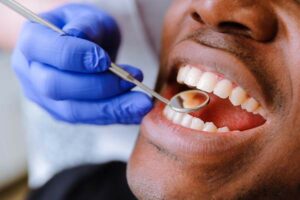Are you considering getting one or several dental implants? If so, you are probably thinking about how the implant surgery will affect you on the short and long term, and part of that is the pain associated with it. The experience of getting dental implants can vary from person to person, and pain tolerance will have a huge effect on this. In general, there can be some discomfort during and after the dental implant procedure, but it should be manageable. This discomfort can also be mitigated with proper care and pain management techniques. Here is what to expect:
- The implant surgery will be performed under local anesthesia. This means you will feel the pressure of the needle when the dentist applies the novocaine, but pain will be minimal during this stage. You might experience pressure or vibrations and hear sounds, which can be intimidating to some people, but you will not be able to tell when the implant is already in your jaw at this point.
- After the anesthesia wears off, you might experience some discomfort or mild pain, and this is okay. The body has undergone trauma and it is its way of expressing that something happened. It is also common to experience swelling and even some bruising around the surgery area immediately after the surgery. As a protocol, your dentist will prescribe pain medication and possibly some preventative antibiotics and anti-inflammatory pills.
- The healing process takes several days. The first three are critical since it is when the surgery area will be most exposed to bacteria. It is important to keep the area clean. Also, the third day will be the peak of inflammation. Swelling and bruising are common but they should start to get better by the fourth and fifth day. The entire healing process will depend on how your body processes and receives the implant. During this time, it is important to also follow your dentist’s post op instructions, which may include recommendations in diet, exercise, and oral hygiene practices.
- After the healing period, your implant will gradually integrate into your bone in a process called osseointegration. The entire process for the implant to integrate takes 3-4 months. At this time, the implant will be ready to be restored and function like natural teeth. Pain at this point should be minimal.
In conclusion, in order to overcome the implant surgery with the least amount of pain during and after the procedure, follow all your aftercare recommendations. These can include not smoking, swishing or spitting. Take the prescribed medication as recommended. Have a soft and cold diet for the first three days after surgery. This will help avoid contamination of the wound and prevent applying pressure over it. The cold helps clotting and stop the bleeding. Applying cold compresses over your cheeks and over the surgery area will help contain the inflammation. Also, avoid strenuous exercise and extreme activities as these can cause bleeding. Finally, maintain a good oral hygiene to promote healing and prevent infections.
It is important to discuss with your dentist or surgeon about what to expect of the surgery so that you can also set your expectations. Given your clinical record, he may give some personalized recommendations too. Despite the surgery part, most patients are happy they went through it. At the Costa Rica Dental Team, we have placed hundreds of implants and restored a similar amount. Trust us, we know what we are doing. We are a dental office located in San Jose, Costa Rica and we offer an alternative option to the rising costs of dental implants in the US and Canada. Contact us to find out how to get your own implants!




